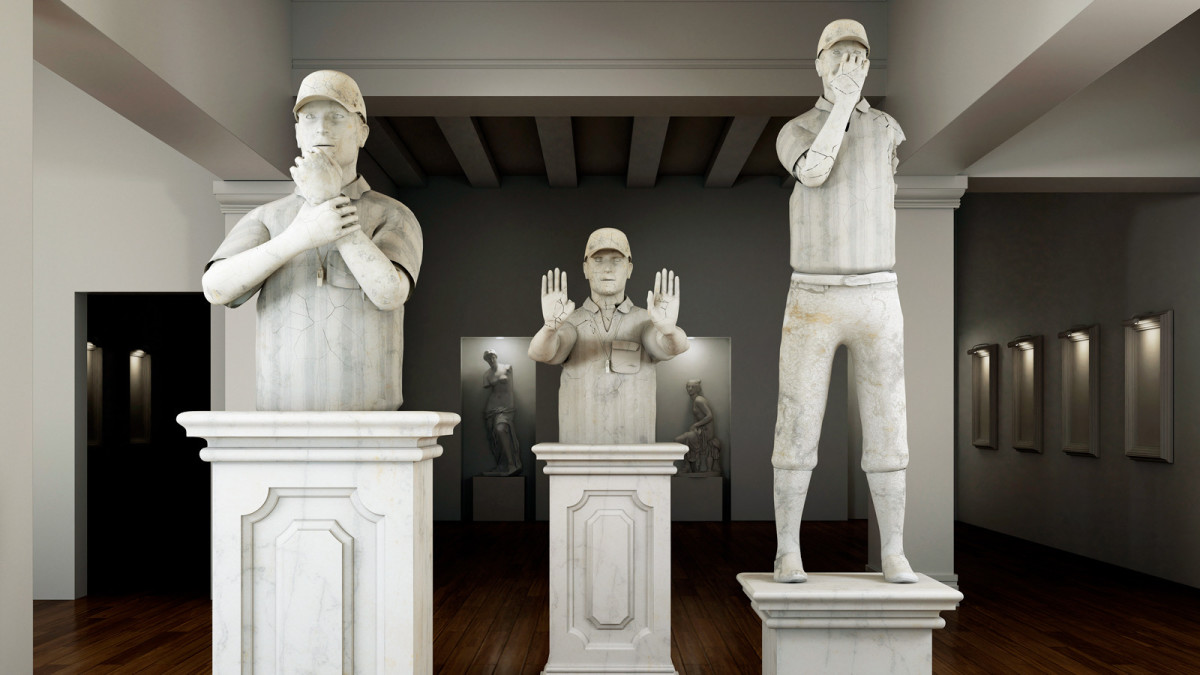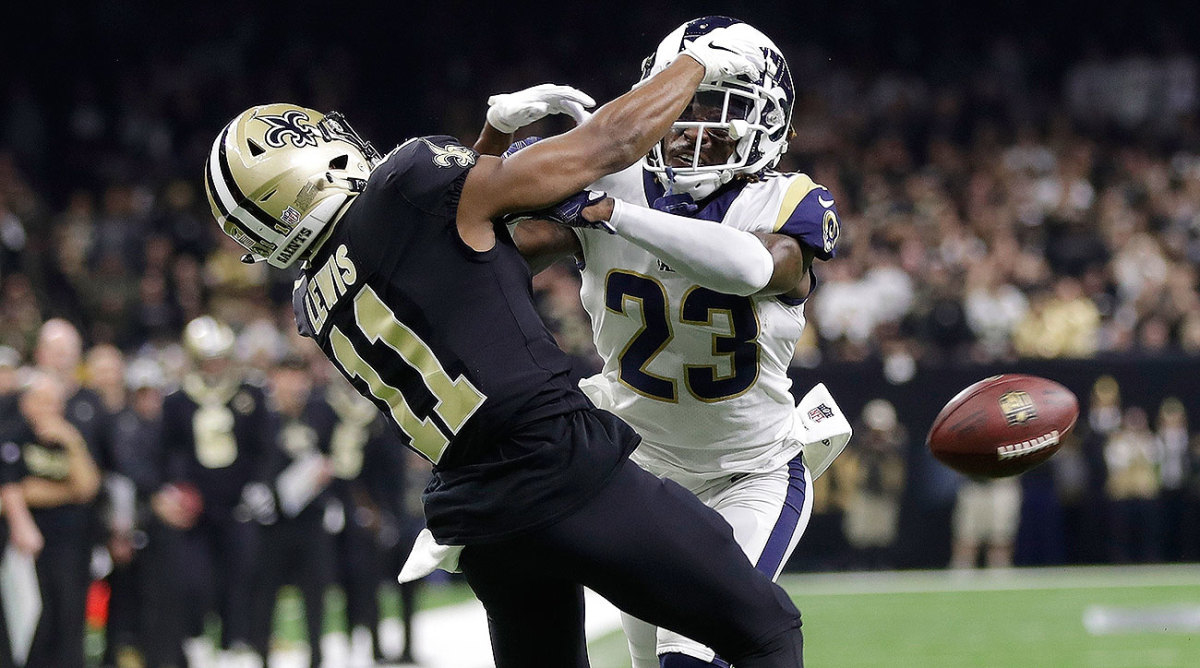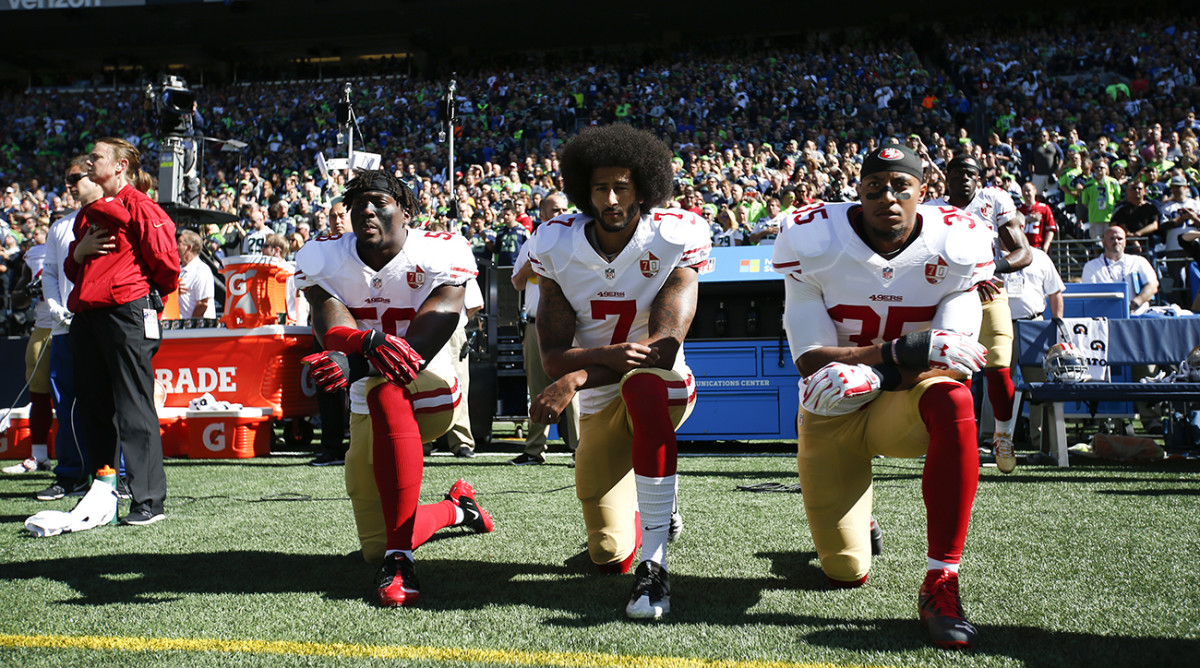When It Comes to Innovating, the NFL Is Frozen in Time


With three minutes remaining in an early-October loss to the Patriots, Giants quarterback Daniel Jones dropped back on third-and-10 and threw in the direction of Golden Tate, who was covered tightly by cornerback Jonathan Jones on a post route. As the ball arrived, Jones hooked Tate's right arm and the pass, predictably, fell incomplete. The receiver, looking for a flag, raised his hands in bewilderment. Only now, thanks to a newly introduced rule that permits challenging pass interference penalties (or, here, the lack thereof), New York coach Pat Shurmur had a course of action. He threw his red flag.
While the head game official, Brad Allen, marched over to the sideline replay station, Fox's broadcasters reviewed the sequence: Jones illegally engaging with Tate before he broke in his route . . . Jones draping himself around Tate's backside as if posing for a prom photograph. After which color man Troy Aikman and rules analyst Mike Pereira agreed that by the letter of the law, this was pass interference.
Then, after a 63-second examination, Allen marched back onto the field and made the call. Ruling confirmed. No pass interference.
#NFL officials have gone rogue. 100-percent. This wasn’t called on the field and then wasn’t changed after it was flagged by the #Giants. So they ruled TWICE that this wasn’t defensive pass interference. Which is just blatantly wrong and a purposeful refusal to change the call. pic.twitter.com/BY2rRE6gQc
— Charles Robinson (@CharlesRobinson) October 11, 2019
Shurmur, looking indignant, shooed off the referees trying to explain their case. Predictably, an onslaught of Twitter vitriol followed. By November, the problem had grown so bad—coaches are only getting P.I. calls overturned on 9% of their challenges—that Super Bowl-winning coach Tony Dungy, sage of the NFL, tweeted out a plea for the league to scrap the new rule entirely. This past Sunday, 49ers cornerback Richard Sherman suggested that the only reason he was getting his calls reversed was because he was in a position of power at the players’ union. A frustrated Bill O’Brien, after a particularly egregious non-overturned call on DeAndre Hopkins against the Ravens, told reporters after the game: “I have no idea. I have no idea what pass interference is anymore. No idea.”
How did we get here? Reviewable pass interference was born out of one horrifically blown call in last season's NFC championship game, when officials failed to flag Rams defensive back Nickell Robey-Coleman for a full-speed, helmet-to-helmet hit on Saints receiver Tommylee Lewis before the arrival of the ball, deep in Los Angeles territory, late in a tied game. Fans, coaches, reporters, players—seemingly everyone—lost their collective minds over the idea that New Orleans would miss Super Bowl LIII because of an officiating mistake, and they demanded that the NFL do something about it. One Saints fan even took a related lawsuit all the way to the Louisiana Supreme Court before it was dismissed.

Over the spring the NFL's competition committee cycled through proposal after proposal until arriving at the one solution for which they could muster enough support. Pass interference review was voted in almost unanimously, with what seemed a clear directive: Correct only the big mistakes.
The problem, as long-time NFL referee (and current ESPN rules analyst) John Parry explained to me the morning after the officials robbed Tate, is not one of conspiracy. As much as a certain corner of the sports world would like to imagine increasingly neutered referees stubbornly refusing to overturn their own calls, the issue boils down more simply to: It's damn hard to define a big mistake. To that point, Parry isn't even certain that, under the new rule, last winter's noncall would have been overturned. "My definition of a train wreck and your definition of a train wreck," he said, "are different."
The cynic asks, then: How can the multibillion-dollar behemoth of American sports spend an entire offseason brainstorming what was destined to be one of its most significant innovations in recent memory, and end up on the insipid, please-all-please-none idea of leaving overworked, inexperienced officials to play Justice Potter Stewart's game of I-know-it-when-I-see-it in front of millions of viewers each Sunday? That's so like the NFL! They can't do anything right!
But the realist—the truly self-aware realist—might wonder instead what role we all play in this. When considering how to address pass interference, the NFL had to keep in mind not just the Get it right! crowd but also the particular subset of fans who were always going to complain (and complain they have) about reviewable pass interference making games too long, who feel replay of any kind is sucking a certain human element out of the game. They had to consider both those who want the NFL to resemble its wholesome, leather-helmet salad days, before tech started creeping in . . . and those who wouldn't care if the entire thing turned into a pyrotechnic Fortnite battle royale.
Pass interference review has opened a small window both into the wildly different agendas of the NFL fan base and, more worryingly, into the league's inability to respond to any number of crises. Now that football has captivated everyone, nearly every major decision must be framed not only in the context of what's happening today and in the future, but also how far that decision will deliver us from the foundational aspects of the game that attracted so many people in the first place.
So, how does something grow from such a place? Can anything?
* * *
Go back 100 years and the NFL began like an indie rock band. Clamorous and experimental, creative and desperate, the league was willing to try anything. Rules were added early on to amp up scoring, to differentiate the pro game from college. When the Bears' Bronko Nagurski turned a fake dive into a cool-looking touchdown jump pass during the 1932 NFL title game, the league quickly pivoted, abolishing a rule that required passes be thrown at least five yards behind the line of scrimmage. Throw from anywhere? Why the hell not? The early NFL made aesthetic changes, strategic changes, changes to the idea of how a professional sports league was structured in the first place. And eventually all of that tinkering and all those modifications yielded a smash hit.
After attaining a certain amount of success, though, the band members were disincentivized from change, from just trying things anymore. Sure, they could tinker with the little stuff, like extending the goalposts five feet—details amounting to a new set of drumsticks—but there are myriad examples that demonstrate the dangers in straying too far from the product. By the turn of the century they found they'd become a kind of ideological purgatory for the creative soul. They were forced to adhere to (or at least address) evolving social trends and norms, and they became an easy, attractive target for critics.
All this heightened awareness changed the band. Some members wanted to keep the music the same, roll out the hits, keep printing money. Some wanted to change the direction entirely, evolve with their surroundings. Some just wanted to play, man. No matter what the band created from that point on, the outside world would never be wholly satisfied.
Consider in this context how the NFL has tackled its biggest challenges in recent years, and how its audience has responded:
• When forensic pathologist Bennet Omalu's discoveries led to a mainstream knowledge of chronic traumatic encephalopathy and, more broadly, to increased attention on the terrifying postcareer lives of NFL players dealing with degenerative health issues related to football, the league was forced into enacting sweeping changes to its rule book, playing style and equipment. More than 15 years later, though, we're still arguing about the handling of helmet-to-helmet hits, about whether the game has become too soft. While some insist the league has not done enough here, others howl over rule book minutiae, like the 2018 tweak penalizing a defender who places his body weight unnecessarily on a quarterback after sacking him. There remain players who complain that yesterday's helmets were more comfortable.
• When the President politicized Colin Kaepernick's kneeling protest of social injustice and racial inequality two years ago, the NFL was pressured by a large swath of fans to enact an official national anthem policy. After the league effectively chose to side with the President, allowing teams the flexibility to punish those who don't stand for the anthem, the outcry from the other side—players and their union, the President's detractors and, more broadly, advocates of free speech—was so severe that just two months later, the NFL indefinitely suspended its new policy.

• When the league started bending the rule book to create an advantageous environment for passing the football (and when that rule-bending met an explosion of new college-inspired schemes that defenses weren't prepared to stop), the corresponding points boom again divided those who loved outcomes with comically high, fantasy-football-like scores and those who see this all as a harbinger of some unrecognizable future game.
It all makes you wonder whether it's possible for the NFL to do anything right, to create something new against such a polarizing backdrop. It also helps one understand why today's rare stabs at innovation resemble, well, pass interference review. Any new legislature must pass a vote by owners, each seeking to please the ticket- and subscription- and jersey-buying masses.
It's funny, the nostalgia this environment triggers for the days when things weren't so complicated. Old slow-motion highlights of your favorite cornerback gliding downfield after an interception—back before you feared it would all end in a 10-minute discussion about the degree to which the defender maybe contacted the receiver before the pick. Old records, back before the band got big.
* * *
In March 2019, in a press conference that concluded the spring meetings, NFL competition committee chairman Rich McKay announced a 31-1 vote by owners to adopt reviewable pass interference. He smiled when he said he felt as if he'd been discussing instant replay for years and that he would probably continue to do so moving forward, in a way correctly predicting that the P.I. argument would not die on that podium.
"We went down the path of trying to figure out a rule that would expand replay, that we could get [the necessary] 24 votes for," McKay said. "And any time you deal in the replay world, getting 24 votes is not quite as easy as you think. We came up with Rule Proposal 6, Rule Proposal 6A, Rule Proposal 6B. . . . And we passed Rule Proposal 6C. So, we were able to make sausage in one day."
Making sausage. Today's league could try just about anything, and the result seems destined to resemble a sort of mixed meat, with bits and flecks of this and that. Varied but not pure. Broadly appealing, and yet precisely appealing to no one. To go back to the music analogy: Like some unlistenable compilation of Grammy rock, destined for a mall P.A. near you. The Foo Fighters in year 35. The Rolling Stones at 60.
It's hard not to wonder whether this sort of creative blockage will define the coming years of professional football. As baseball and basketball experience technological and ideological renaissances of sorts, have football consumers collectively willed the NFL into this uncomfortable standstill?
On the morning Parry addressed the Tate controversy, I couldn't help but think about the days before instant replay. You could complain in a vague sense back then about a call or a noncall, but there was not yet a cottage industry devoted to dissecting each and every one of them. A disputed play was fleeting, it was gone. There was a pervasive sense of imperfection, but blissful imperfection. Imagine referees stopping to huddle and debate and maybe erase the Immaculate Reception. Instead, the league could motor ahead without being constantly reminded of a problem they weren't entirely sure even existed.
Compare all that to today, when nearly every Monday night on television Parry seems to find himself in the thick of a conversation that is eroding the profession he cared deeply about for nearly two decades. From his perspective: Officials call 40,000 plays per season and internally are graded out between 95% and 97% accuracy—and yet we constantly zero in on what they missed. "You're seeing officiating break down," he said.
So? We could pretend this album never happened. Turn back the clock, eliminate pass interference review, kick the can down the road, rewind to the same problematic scene of a year ago. Or we could lean on technology—last year, before folding, the upstart Alliance of American Football showcased a promising Sky Judge replay system to strong reviews—though you just know it would trigger every fan and coach and owner who wants to to carbon-freeze the game and preserve the exact thing they fell in love with a long time ago.
It's in these moments of almost aggressive closed-mindedness across the board, as the league and its fans tie themselves in knots, that we'll hear a new song from our favorite old indie band. And we'll realize now how unfamiliar it all feels.
Question or Comment? Email us at talkback@themmqb.com.
